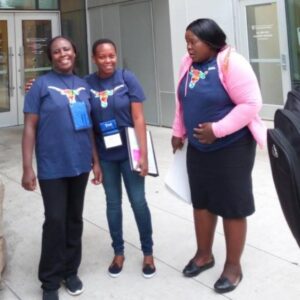This year, International Youth Day will recognize the meaningful participation of youth innovation for human and planetary health. To celebrate International Youth Day, we are highlighting one of our many inspiring alumni: Celestina Richard Livigha of the Pan Africa Youth Leadership Program (PAYLP). Livigha spoke with Meridian’s Center for Global Leadership to reflect on her youth exchange experience and its impact of her leadership journey.
Livigha is from Tanzania and a proud PAYLP alumna from the 2018 April cohort. She recently participated in the Fulbright Teaching Excellence and Achievement Program at the University of Massachusetts in Spring 2021. Livigha shared, “My experiences in PAYLP enabled me to see challenges in my community as an opportunity to think outside the box. I also had the chance to demonstrate those leadership skills working as a mentor during PAYLP 2018 and as a volunteer PAYLP Pal In-Country Liaison for Meridian two consecutive years before the pandemic.”
Why is the empowerment of youth important to you?
Empowering youth is important to me because it is important to give back to communities. When you teach a young person entrepreneurship skills, it will help them fundraise and solve issues; they become independent because they have a purpose and something to solve. The empowerment of youth is also important because youths can learn how to develop an idea. When PAYLP participants return to their home countries after the program, they use the civic engagement mindset to start thinking about things they can do to help their country. When youth lead community projects, they do not just benefit themselves and grow as leaders, but support the wellbeing of others too.
Youth are the future leaders of tomorrow. When you empower them, you are empowering upcoming leaders, innovators and entrepreneurship that will be committed to supporting others.
How have you evolved personally and professionally since being both a PAYLP Mentor and a PAYLP Pal?
As a PAYLP Mentor and a PAYLP Pal, I was taught to be confident in myself and to express myself with people from other countries. PAYLP was my first time working with people outside of Tanzania which helped build my confidence. Being a PAYLP Mentor and a PAYLP Pal allowed me to apply for new experiences, organize, teach and discuss my profession with people from other countries. Additionally, my English communication skills improved drastically, which expand my network both inside and outside of Tanzania. Lastly, as a PAYLP Pal, I had the opportunity to work with a big organization to distribute the technology. I was responsible for identifying who needs what kind of technology in order to participate and assist with teaching participants how to use the technology. This role allowed me to learn how to organize people and work on logistics, which was a new experience for me. I see myself growing in my career and believe I can do just that with the experience I received from being a PAYLP Mentor and PAYLP Pal.
In what ways do your continued interactions with the PAYLP Network and greater Meridian exchange alumni communities make you feel stronger connections with the global community?
I have a strong connection with the people I met in the PAYLP program and use what I’ve learned from them to help my community. I told them about two students I was supporting: a 14-year-old girl who came from a challenging life, but she stayed in school despite being stigmatized from being an HIV victim. My efforts resulted in ensuring she received her medications, meals, and any other necessities. I was also able to provide money to help other students continue their education. Following this, I wrote a project proposal to share with friends and the community. Raising money ad-hoc is difficult, so I came up with the idea of registering an organization that could support students. We decided to create a vision, objectives and mission of the organization. Then, the government supported the registration of our organization that will manage to reduce the number of students in Tanzania who drop out of school.
Why is cultural exchange important to you?
Cultural exchange is important to me because it allows people from different backgrounds, cultures and customs to interact. When people from another background enter a community, it is difficult at first for people within that community to understand their customs. After interacting, they can connect and understand each other’s customs. I believe it helps to represent our country in other nations. People may have certain perceptions of one country, but when they sit together and discuss their customs and shared values, it is easier to find something positive – and avoid misconceptions. When people broaden their perspectives and understandings, then they can share more and connect more authentically with other people.
Special thanks to Meridian Center for Global Leadership Fellow Catherine Cata for conducting, writing, and editing this alumni interview alongside PAYLP Program Coordinator, Katie Conti
















